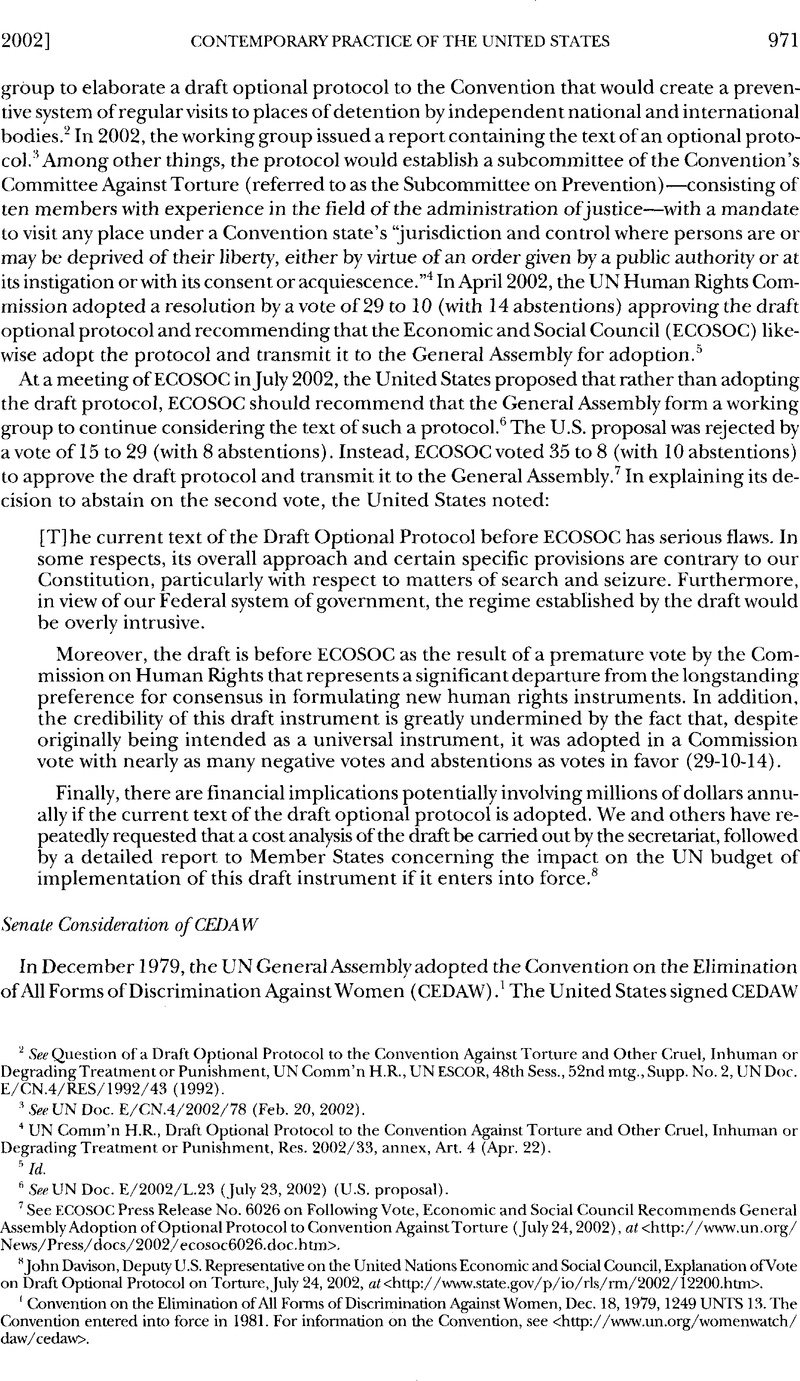No CrossRef data available.
Article contents
Senate Consideration of CEDAW
Published online by Cambridge University Press: 10 March 2017
Abstract

- Type
- Contemporary Practice of the United States Relating to International Law
- Information
- Copyright
- Copyright © American Society of International Law 2002
References
1 Convention on the Elimination of All Forms of Discrimination Against Women, Dec. 18, 1979,1249 UNTS 13. The Convention entered into force in 1981. For information on the Convention, see <http://www.un.org/womenwatch/daw/cedaw>.
2 See Nash, Marian, Contemporary Practice of the United States, 89 AJIL 96, 102 (1995)Google Scholar.
3 See Treaty Doc. 96-53: Convention on the Elimination of All Forms of Discrimination Against Women, Adopted by the U. N. General Assembly on December 18, 1979, and Signed on Behalf of the United States of America on July 17, 1980: Hearing Before the Senate Comm. on Foreign Relations, 107th Cong. (2002).
4 Id. (statement of Senator Joseph R. Biden, Jr.).
5 [Editor’s Note: See Concluding Observations on the Committee on the Elimination of Discrimination Against Women: Belarus, para. 361, UN Doc. A/55/38 (Jan. 31, 2000), which states: “The Committee is concerned by the continuing prevalence of sex-role stereotypes and by the reintroduction of such symbols as a Mothers’ Day and a Mothers’ Award, which it sees as encouraging women’s traditional roles.”]
6 [Editor’s Note: See Concluding Observations on the Committee on the Elimination of Discrimination Against
Women: China, paras. 288-89, UN Doc. A/54/38 (Feb. 3,1999), which states: “The Committee is concerned that prostitution, which is often a result of poverty and economic deprivation, is illegal in China.. .. The Committee recommends decriminalization of prostitution.”]
7 [Editor’s Note: See Concluding Observations on the Committee on the Elimination of Discrimination Against
Women: Croatia, paras. 109, 117, UN Doc. A/53/38 (May 14, 1998), which states:
In the area of health, the Committee is particularly concerned that services pertaining to women’s Reproductive health are the first to be affected as a result of the Government’s financial constraints. It is also concerned about information regarding the refusal, by some hospitals, to provide abortions on the basis of conscientious objection of donors. The Committee considers this to be an infringement of women’s Reproductive rights.
. . . .
The Committee strongly recommends that the Government take steps to secure the enjoyment by women of their Reproductive rights by, inter alia, guaranteeing them access to abortion services in public hospitals.]
8 Letter from Secretary of State Colin L. Powell to Senator Joseph R. Biden, Jr. (July 8, 2002), at <http://www.senate.gov/~foreign/minority> (footnotes omitted)
9 [Editor’s Note: Newdow v. U.S. Congress, 292 F.3d 597 (9th Cir. 2002) (finding that requiring public school children to recite the words “under God” in the pledge of allegiance violates the First Amendment’s separation of church and state).]
10 Letter from U.S. Dep’t of Justice Assistant Attorney General for Legislative Affairs Daniel Bryant to Senator Joseph R. Biden, Jr. (July 26, 2002) (footnotes omitted), at <http://www.senate.gov/~foreign/minority>.
11 See 148 Cong. Rec. D853 (daily ed. July 30, 2002); see also Dao, James, Senate Panel Approves Treaty Banning Bias Against Women, N.Y. Times, July 31, 2002, at A3 Google Scholar.


